实验3
实验任务1
#include<stdio.h> #include<stdlib.h> #include<time.h> #include<windows.h> #define N 80 void print_text(int line, int col, char text[]);//函数声明 void print_spaces(int n);//函数声明 void print_blank_lines(int n);//函数声明 int main(){ int line, col, i; char text[N] = "hi,April~"; srand(time(0));//以当前系统时间作为随机种子 for(i = 1;i<+ 10; ++i){ line = rand()%25; col = rand()%80; print_text(line, col, text); Sleep(1000);//暂停1000ms } return 0; } // 打印n个空格 void print_spaces(int n) { int i; for(i = 1; i <= n; ++i) printf(" "); } // 打印n行空白行 void print_blank_lines(int n) { int i; for(i = 1; i <= n; ++i) printf("\n"); } // 在第line行第col列打印一段文本 void print_text(int line, int col, char text[]) { print_blank_lines(line-1); // 打印(line-1)行空行 print_spaces(col-1); // 打印(col-1)列空格 printf("%s", text); // 在第line行、col列输出text中字符串 }
该代码在屏幕上间隔1s生成10个“hi,April~”
实验任务2
task2_1.c
//利用局部static变量的特性,计算阶乘 #include<stdio.h> #include<stdlib.h> long long fac(int n);//函数声明 int main(){ int i, n; printf("Enter n:"); scanf("%d", &n); for(i = 1;i <= n; ++i) printf("%d! = %lld\n", i, fac(i)); system("pause"); return 0; } //函数定义 long long fac(int n){ static long long p = 1; p = p*n; return p; }
增加一行源代码后,测试结果截图:
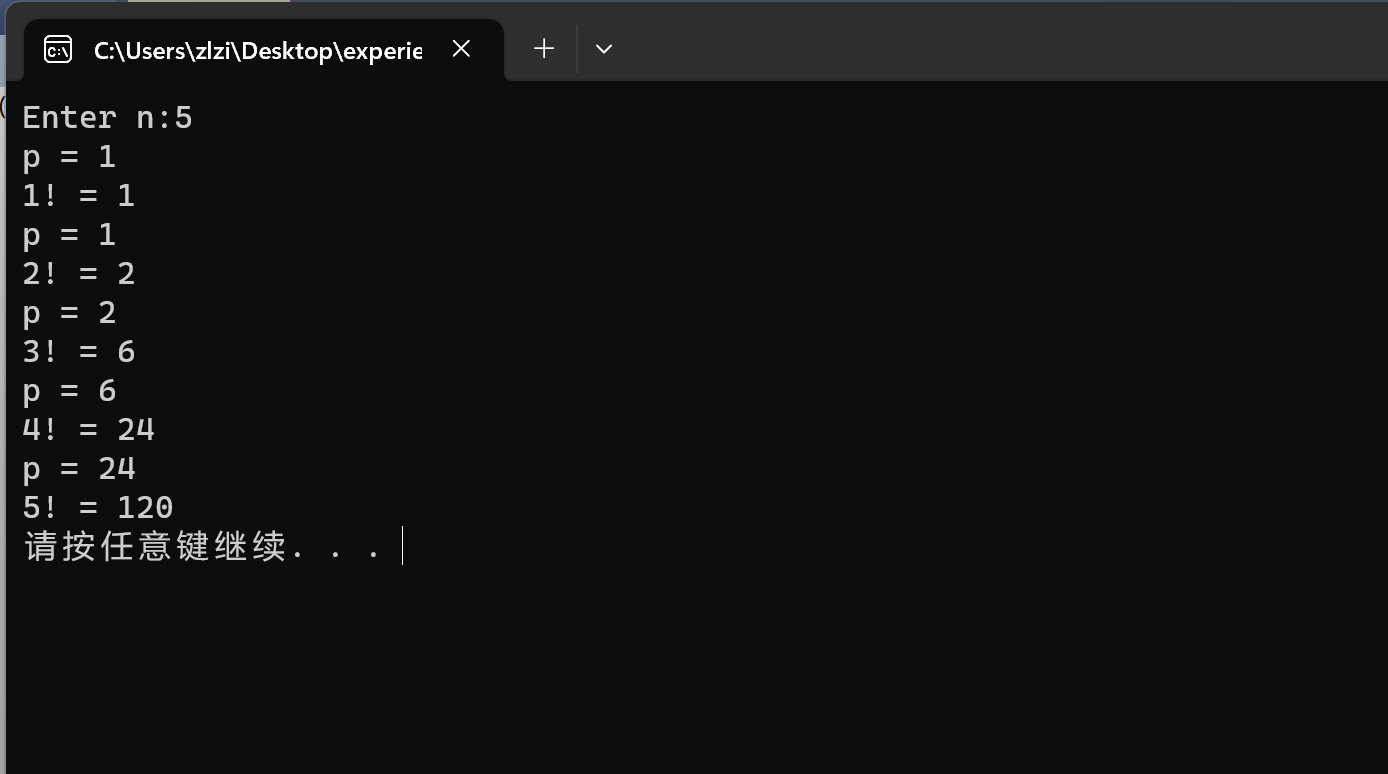
task2_2.c
//练习:局部static变量特性 #include<stdio.h> #include<stdlib.h> int func(int, int);//函数声明 int main(){ int k = 4, m = 1, p1, p2; p1 = func(k,m);//函数调用 p2 = func(k,m);//函数调用 printf("%d, %d\n",p1,p2); system("pause"); return 0; } //函数定义 int func(int a, int b){ static int m = 0, i = 2; i+=m + 1; m = i + a + b; return m; }
运行截图

总结局部static变量的特性:
局部变量只会在最开始初始化,运行过程中不会
函数执行完后,数据不会丢失会保留变量的值,在下一次调用函数时,变量仍会记得原来的值
实验任务3
#include<stdio.h> #include<stdlib.h> long long func(int n);//函数声明 int main(){ int n; long long f; while (scanf("%d",&n) !=EOF){ f = func(n);//函数调用 printf("n = %d,f = %lld\n", n, f); } system("pause"); return 0; } long long func(int n){ long long ans; if(n==1) ans=1; else ans = 2*func(n-1)+1; return ans; }
运行结果
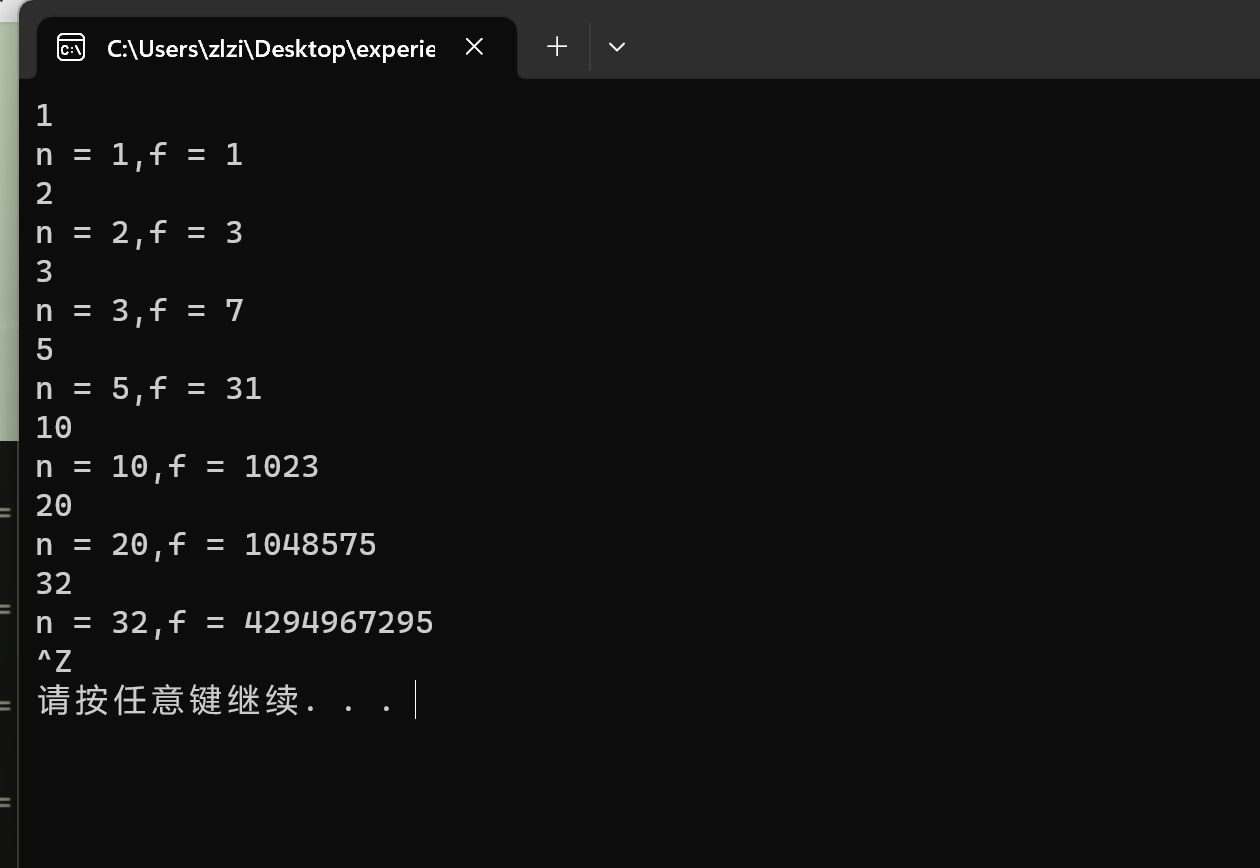
实验任务4
#include<stdio.h> #include<stdlib.h> int func(int n, int m); int main(){ int n, m; while(scanf("%d%d", &n, &m) !=EOF) printf("n = %d, m = %d, ans = %d\n", n, m, func(n,m)); system("pause"); return 0; } int func(int n, int m){ int ans; if(n==m||m==0) ans=1; else if(n<m) ans=0; else ans=func((n-1),m)+func((n-1),(m-1)); return ans; }
运行截图
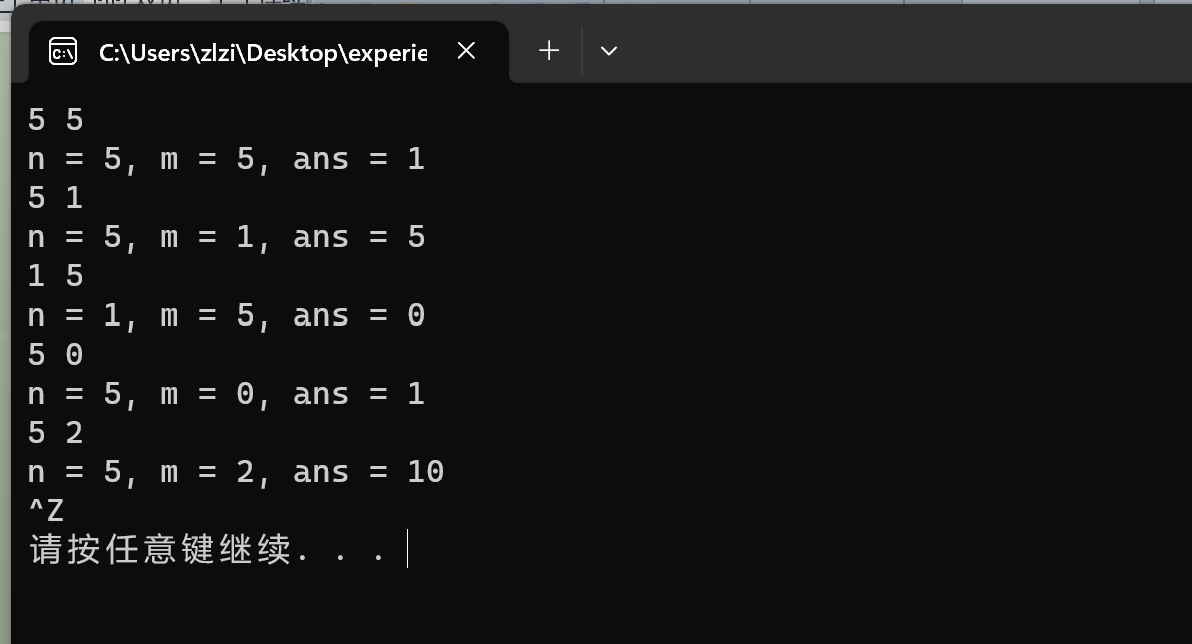
实验任务5
task5_1.c
程序源码
#include<stdio.h> #include<stdlib.h> double mypow(int x, int y);//函数声明 int main(){ int x, y; double ans; while(scanf("%d%d", &x,&y) !=EOF){ ans = mypow(x, y);//函数调用 printf("%d的%d次方: %g\n", x, y, ans);//两个n什么用捏 } system("pause"); return 0; } double mypow(int x, int y){ int i=1; double ans=1; if(y>=0){ for(i=1;i<=y;i++) ans=1*x*ans;} else{ for(i=1;i<=y;i++) ans=ans*1/((double)x);} return ans; }
运行截图
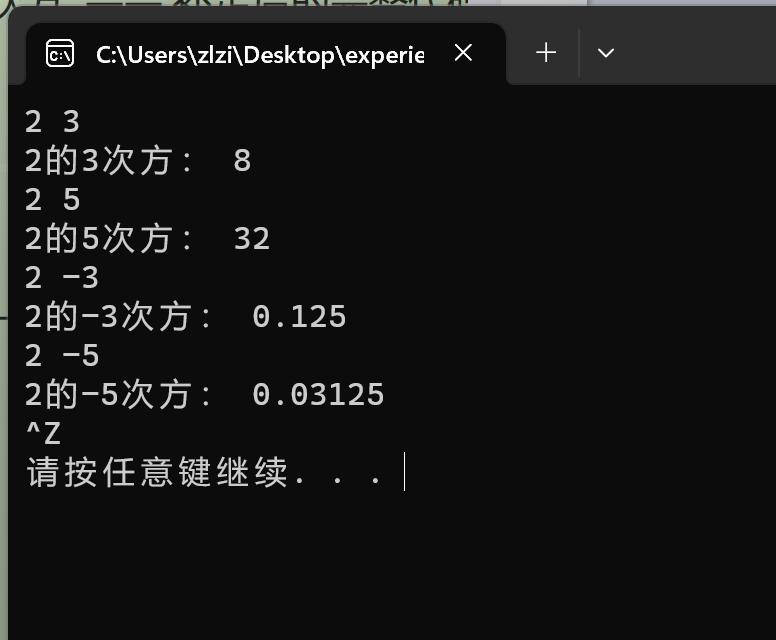
task5_2.c
程序源码
#include<stdio.h> #include<stdlib.h> double mypow(int x, int y);//函数声明 int main(){ int x, y; double ans; while(scanf("%d%d", &x,&y) !=EOF){ ans = mypow(x, y);//函数调用 printf("%d的%d次方: %g\n", x, y, ans); } system("pause"); return 0; } double mypow(int x, int y){ double ans; if(y==0) ans=1; else if(y>0) ans=x*mypow(x, y-1); else ans=1/mypow(x, -y); return ans; }
运行截图
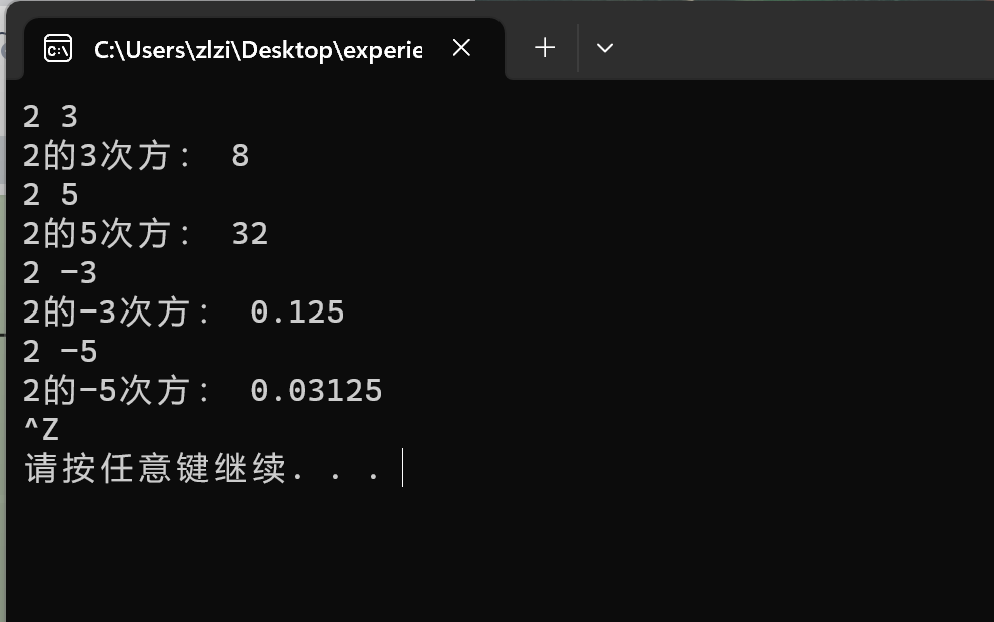
实验任务6
程序源码
#include<stdio.h> #include<stdlib.h> #include<math.h> void hanoi(unsigned int n, char from, char temp, char to); void moveplate(unsigned int n,char from,char to); int main() { unsigned int n; int i; while(scanf("%u",&n)!=EOF){//输入盘子数目 hanoi(n,'A','B','C'); i=pow(2,n)-1;//熟悉熟悉熟悉熟悉熟悉熟悉熟悉熟悉熟悉 printf("\n一共移动了:%d次\n",i);} system("pause"); return 0; } void hanoi(unsigned int n,char from,char temp,char to) { if(n==1) moveplate(n,from,to); else { hanoi(n-1,from,to,temp);//n-1个盘子从A以C为中转移到B上 moveplate(n,from,to);//将盘子n从A转移到C上 hanoi(n-1,temp,from,to);//将n-1个盘子从B以A为中转移到C上 } } void moveplate(unsigned int n,char from,char to) { printf("%u:%c-->%c\n",n,from,to); }
运行截图
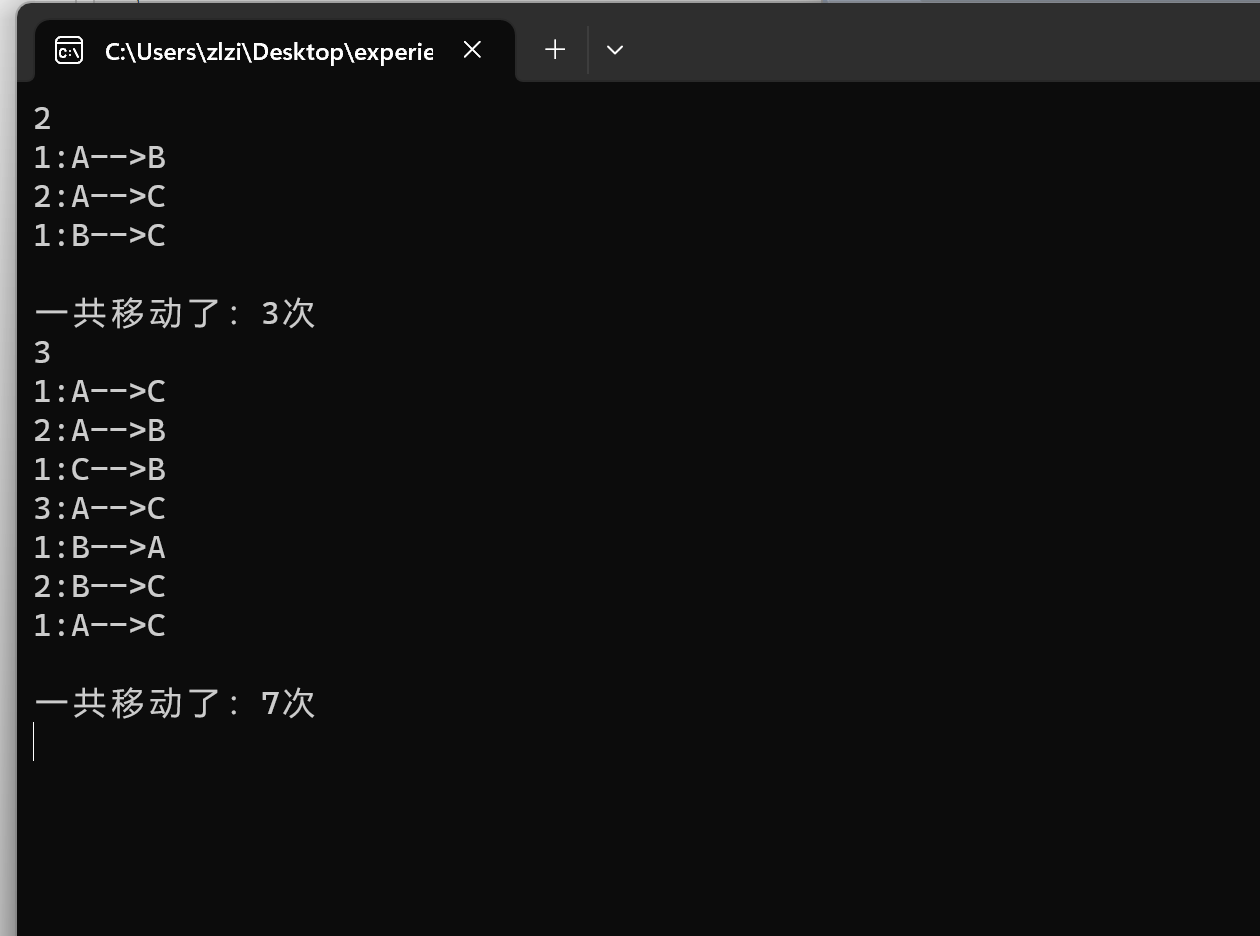
实验任务7
程序源码
#include<stdio.h> #include<stdlib.h> int is_prime(int n) { int i; int k=1; for(i = 2;i < n;i++) { if(n%i==0) { k=0; break; } } return k; } int main() { int n; int i; while(scanf("%d",&n)!=EOF){ if(n>2 && n%2==0) { for(i=2;i<n;i++) { if(is_prime(i)&&is_prime(n-i)) { break; } } printf("%d=%d+%d\n",n,n-i,i); } else { printf("请重新输入!\n"); }} system("pause"); }
运行截图
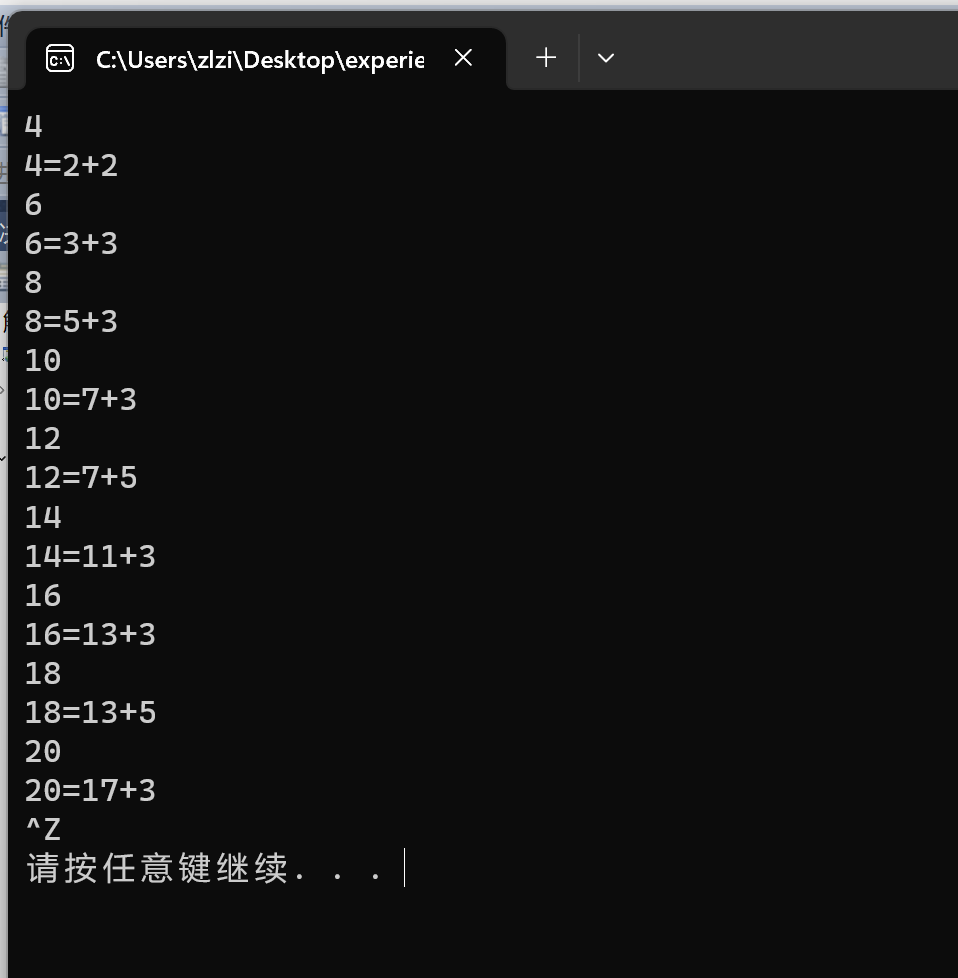
哈哈哈哈哈
实验任务8
程序源码
#include <stdio.h> #include<stdlib.h> #include <math.h> long func(long s); int main(){ long s,t; printf("Enter a number:"); while(scanf("%ld",&s)!=EOF){ t=func(s); printf("new number is:%ld\n\n",t); printf("Enter a number:"); } system("pause"); return 0; } long func(long s) { int t, num=0, i=0; while(s!=0) { t=s%10; if(t%2==1){ num=num+t * pow(10, i); i++; } s=s/10; } return num; }
运行截图
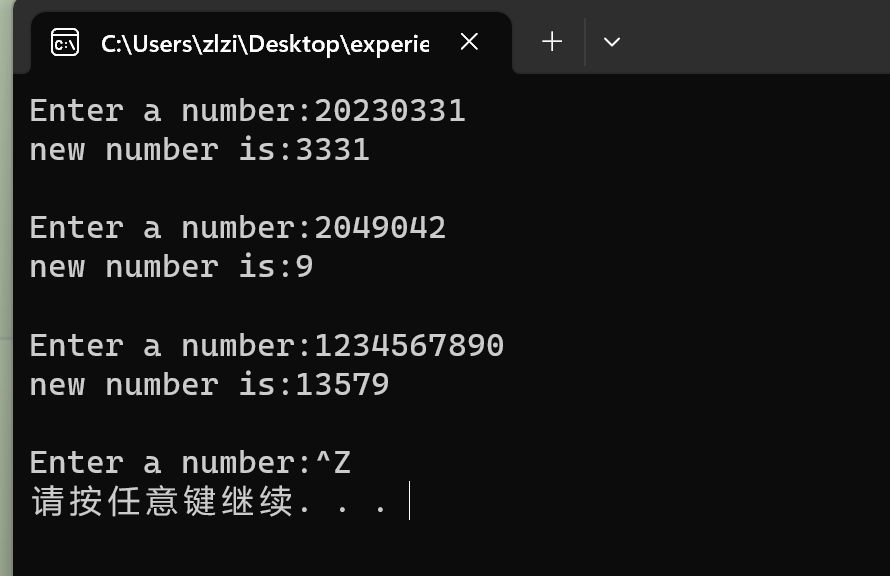


 浙公网安备 33010602011771号
浙公网安备 33010602011771号